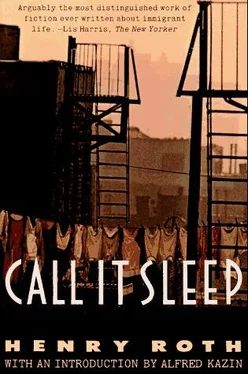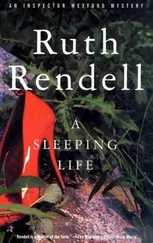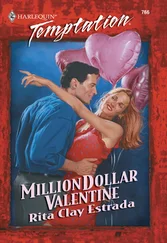“Move back!” He waved the boy away who had reluctantly slipped into the place just vacated before the table. “David Schearl!” he called out, tempering the harshness of his voice. “Come here, my gold.”
Quailing with fright, David drew near.
“Sit down, my child,” he was still breathing hard with exertion. “Don’t be alarmed.” He drew out of his pocket a package of cigarette-papers and a tobacco pouch, carefully rolled cigarette, took a few puffs, then snuffed it out and put it into an empty cigarette box. David’s heart pounded with fear. “Now then,” he turned the leaves of a book beside him to the last page. “Show me how blessed is your understanding.” He drew David’s tense shoulder down toward the table, and picking up the new stick, pointed to a large hieroglyph at the top of the page. “This is called Komitz. You see? Komitz. And this is an Aleph. Now, whenever one sees a Komitz under an Aleph, one says, Aw.” His hot tobacco-laden breath swirled about David’s face.
His mother’s words about her rabbi flashed through his mind. He thrust them aside and riveted his gaze to the indicated letter as if he would seal it on his eyes.
“Say after me,” continued the rabbi, “Komitz-Aleph — Aw!”
David repeated the sounds.
“So!” commanded the rabbi. “Once more! Komitz-Aleph-Aw!”
And after David had repeated it several times. “And this” continued the rabbi pointing to the next character “is called Bais, and a Komitz under a Bais — Baw! Say it! Komitz-Bais-Baw!”
“Komitz-Bais — Baw!” said David.
“Well done! Again.”
And so the lesson progressed with repetition upon repetition. Whether out of fear or aptitude, David went through these first steps with hardly a single error. And when he was dismissed, the rabbi pinched his cheek in praise and said:
“Go home. You have an iron head!”
III
“ODDS!” said Izzy.
“Evens!” said Solly.
“Skinner!” said Izzy. “Don’ hold back yuh fingers till yuh see wad I’m juttin’ oud.”
They were gambling for pointers as usual, and David stood by watching the turns of fortune. In other corners of the yard were others engrossed in the same game. There were a great many pointers in circulation to-day — someone had rifled the rabbi’s drawer. Nothing else had been taken, neither his phylacteries, nor his clock, nor his stationery, nothing except his pointers. He had been furious, but since everyone else had looked blank, he hadn’t been able to convict anyone. Yet here they were, all gambling for them. David was amused. In fact everything that had to do with pointers amused him. They were one of the few things that relieved the dullness of the cheder. He had thought when he first saw them that the rabbi whittled them out himself, but he soon found out he was wrong: the rabbi broke so many that that would have taken all day. No, the pointers were just ordinary lollipop sticks. And even that had been amusing. An incongruous picture had risen in his mind: He saw his severe, black-bearded rabbi wearing away an all-day sucker. But his fellow-pupils soon enlightened him. It was they who brought the rabbi the lollipop sticks. A gift of pointers meant a certain amount of leniency on the rabbi’s part, a certain amount of preference. But the gift had to be substantial, else the rabbi forgot about it, and since few of his pupils could afford more than one lollipop a day, they gambled for them. Izzy’s luck to-day was running high.
“Yuh god any more?” he asked.
“Yeah,” said Solly. “Make or break! Odds!”
“Waid a secon’. I’m all wet.” He bent sideways and wrung his knee-pants and coattails. They had been arguing so violently a little while ago that someone in an adjacent house had thrown a bagful of water into their midst. Izzy had caught the brunt of it.
“Yowooee!” From a distance a long-drawn cat-call.
They looked around. “Who is it?”
“I’ll see.” Yonk who was standing near the fence shinnied up a wash-pole. “It’s Moish,” he announced. “He’s t’ree fences.”
“Only t’ree fences?” Contemptuously they resumed their game.
There was an approaching scuff and clatter. Moish climbed over the fence. “Any janitors?” he asked.
“No janitors,” said Yonk patronizingly and slid down the wash-pole. “Yuh don’ make enough noise, dat’s why. Yuh oughta hea’ Wildy.”
“Who don’ make enough noise? I hollered loud like anyt’ing. Who beats?”
“Who’djuh t’ink? Wildy beats. He god faw fences an’ one janitor. Mrs. Lechtenstein on seven-sixty-eight house. She went smack wit’ de broom, but Wildy ducked.”
Fence-climbing was one of the ways by which the rabbi’s pupils entered the cheder. The doorway that led into the cheder yard was too prosaic for most of them; they preferred to carve their own routes. And the champion of this, as of everything else, was Wildy. Wildy was nearing his thirteenth birthday and consequently his ‘bar mitzvah’, which made him one of the oldest boys in the cheder. He was the idol of everyone and had even threatened to punch the rabbi in the nose.
“W’ea’s Wildy now?” someone asked.
“He’s waitin’ fuh Shaih an’ Toik t’ comm down,” Yonk looked significantly up at one of the houses. “He’s gonna show em dey ain’t de highest ones wad comms into de cheder.”
“I god t’ree poinders,” said Moish. “Who’ll match me?”
“I’ll play yuh.” Izzy had just cleaned out his opponent. “W’ea didja ged ’em? From de swipe?”
“Naa. Dey’s two goils in my class, an’ anudder kid — a goy. So dey all bought lollipops, an’ de goy too. So I follered dem aroun’ an’ aroun’ an’ den w’en dey finished, dey trowed away de sticks. So I picked ’em up. Goys is dumb.”
“Lucky guy,” they said enviously.
It took more than luck though, as David very well knew. It took a great deal of patience. He had tried that method of collecting lollipop sticks himself, but it had proved too tedious. Anyway he didn’t really have to do it. He happened to be bright enough to avoid punishment, and could read Hebrew as fast as anyone, although he still didn’t know what he read. Translation, which was called Chumish, would come later.
“Yowooee!” The cry came from overhead this time. They looked up. Shaih and Toik, the two brothers who lived on the third floor back had climbed out on their fire-escapes. They were the only ones in the cheder privileged to enter the yard via the fire-escape ladders — and they made the most of it. The rest watched enviously. But they had climbed down only a few steps, when again the cry, and now from a great height—
“Yowooee!”
Everyone gasped. It was Wildy and he was on the roof!
“I tol’ yuh I wuz gonna comm down higher den dem!” With a triumphant shout he mounted the ladder and with many a flourish climbed down.
“Gee, Wildy!” they breathed reverently — all except the two brothers and they eyed him sullenly.
“We’ll tell de janitor on you.”
“I’ll smack yuh one,” he answered easily, and turning to the rest. “Yuh know wad I c’n do if one o’ youz is game. I betcha I c’n go up on de fawt’ flaw an’ I betcha I c’n grab hol’ from dat wash-line an’ I betcha I c’n hol’ id till sommbody pulls me across t’ de wash-pole an I betcha I c’n comm down!”
“Gee, Wildy!”
“An’ somm day I’m gonna stott way over on Avenyuh C an’ jump all de fences in de whole two blocks!”
“Gee!”
“Hey, guys, I’m goin’ in.” Izzy had won the last of the pointers. “C’mon, I’m gonna give ’im.”
“How many yuh god?” They trooped after him.
“Look!” There was a fat sheaf of them in his hand.
Читать дальше












